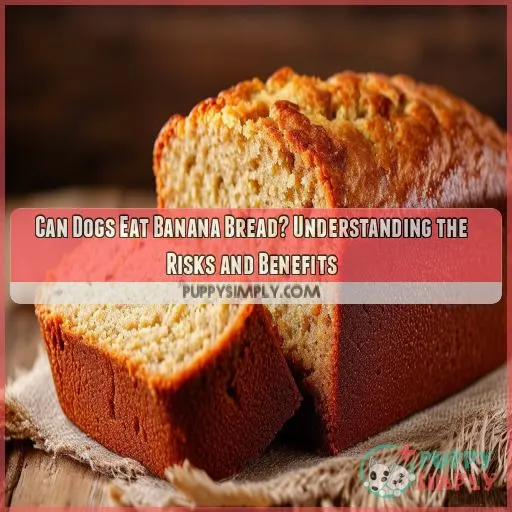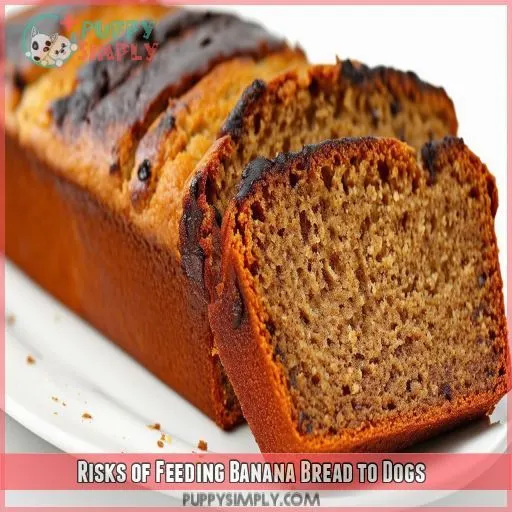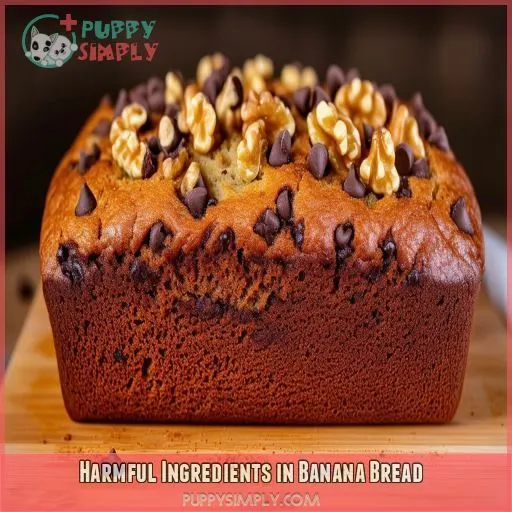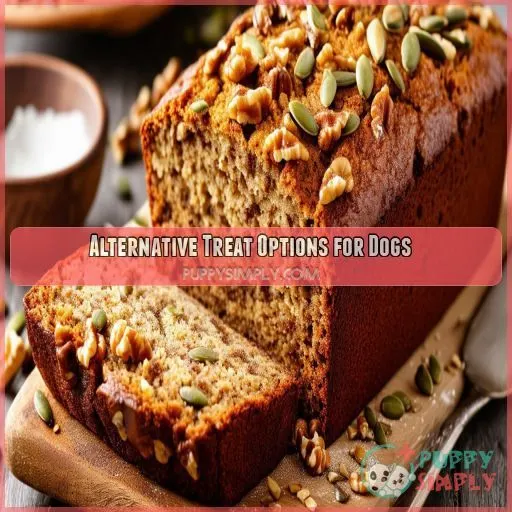This site is supported by our readers. We may earn a commission, at no cost to you, if you purchase through links.
 Your pup’s giving those puppy eyes to your banana bread? While dogs can eat banana bread in moderation, you’ll want to tread carefully.
Your pup’s giving those puppy eyes to your banana bread? While dogs can eat banana bread in moderation, you’ll want to tread carefully.
Plain banana bread made with basic ingredients is generally safe, but those tasty add-ins could spell trouble. Keep your furry friend away from versions containing toxic ingredients like xylitol (artificial sweetener), macadamia nuts, or raisins.
Even regular banana bread packs quite a sugar punch, so it’s best as an occasional treat rather than a regular snack. If your dog has grain sensitivities, you’ll need to be extra cautious.
The good news? There are plenty of dog-friendly alternatives that’ll make their tail wag.
Table Of Contents
Key Takeaways
- Banana bread might seem like a harmless treat, but those enticing loaves often pack a punch with sneaky ingredients that can leave your pup feeling rough – we’re talking sugar overloads, buttery upsets, and even the dreaded chocolate toxicity.
- While a tiny taste likely won’t send Fido to the doggy ER, overindulging could spell disaster for his waistline and tummy. Moderation, my friend, is the name of the game when it comes to sharing human treats with our furry pals.
- But fear not, you can still spoil your four-legged bestie with guilt-free goodies! Imagine their tail-wagging delight over fresh fruit slices, crunchy veggie strips, or even a dollop of good old peanut butter. The treat aisle is a veritable wonderland of canine-approved snacks.
- If you simply must bake for your beloved pooch, go the homemade route with pup-friendly ingredients like whole wheat flour, honey, and applesauce. A little culinary creativity goes a long way in keeping your furry friend happy and healthy!
Can Dogs Eat Banana Bread?
No, dogs shouldn’t eat banana bread. Banana bread typically contains ingredients like sugar, butter, and sometimes chocolate, which can be harmful to dogs and lead to health issues.
Risks of Feeding Banana Bread to Dogs
You might be tempted to share your delicious banana bread with your furry friend, but beware – it could pose serious risks to your dog’s health.
Sugar levels in banana bread can spike your pup’s blood sugar, leading to potential weight gain and other issues.
Butter consumption can cause gastrointestinal upset and pancreatitis in dogs.
And chocolate, often found in banana bread, is downright toxic for canines. Even a small amount can lead to vomiting, diarrhea, and in severe cases, seizures or even death.
While the occasional nibble may not harm, it’s best to err on the side of caution and find safer treat options for your four-legged pal.
Harmful Ingredients in Banana Bread
While banana bread may seem like a harmless treat, it often contains ingredients that can be harmful to dogs, such as sugar, butter, and chocolate. These ingredients can lead to various health issues, so it’s important to be aware of their potential dangers before feeding banana bread to your furry friend.
Sugar
You’ll also want to watch the sugar content in banana bread. While bananas provide natural sweetness and fiber, added sugar can spike your dog’s blood sugar levels. Too much sugar leads to weight gain, dental issues, and even diabetes in dogs. Opt for recipes using natural sweeteners like honey or maple syrup in safe portions instead.
Butter
Speaking of harmful ingredients, let’s discuss butter. It contains saturated fats that can cause digestive issues and weight gain for your pup. Too much butter can also lead to pancreatitis—a painful inflammation. You don’t want Fido developing heart disease, do you? While delicious to us, butter should be avoided in dog treats.
Chocolate
You’ll want to avoid feeding your pup banana bread with dark chocolate, cocoa powder, baking chocolate, chocolate chips, or chocolate syrup. Chocolate contains methylxanthines like theobromine, which dogs metabolize slowly and can cause vomiting, diarrhea, abnormal heart rhythm, seizures, and even death in severe cases. It’s best to skip the chocolate when baking dog-friendly treats.
Safe Ingredients for Dogs in Banana Bread
While some ingredients in banana bread can be harmful to dogs, others are perfectly safe. You’ll find these dog-friendly options are a great way to treat your furry friend:
- Whole wheat flour
- Peanut butter (xylitol-free)
- Honey
- Applesauce
When making banana bread for your pup, stick to recipes using these wholesome ingredients. They provide nutrients dogs need while avoiding potential hazards like excess sugar or fat. With a few smart swaps, you can bake a tasty, dog-approved treat they’re sure to love!
Moderation is Key for Dogs and Banana Bread
While banana bread might be a tempting treat for your pup, portion control is essential. A small bite likely won’t harm your furry friend, but over-indulging could lead to gastrointestinal issues or unwanted weight gain.
Consider the other ingredients too – homemade banana bread with limited sugar and butter is safer than store-bought varieties loaded with unhealthy additives.
Timing also matters – avoid feeding your dog banana bread right before or after meals to prevent digestive upset.
Ultimately, moderation and an understanding of the nutritional value are key when sharing human foods with your canine companion.
Alternative Treat Options for Dogs
Since moderation is crucial when it comes to giving your pup banana bread, you’ll want to explore alternative treat options that are safer and more nutritious.
Consider fruit-based treats like fresh apple or pear slices, or veggie-based snacks like carrot or sweet potato strips.
For a protein boost, opt for yogurt treats or meat-based chews.
And don’t forget dental chews – they’ll keep those pearly whites sparkling clean!
The treat aisle is full of tasty, pup-approved options that won’t leave you worrying about potential hazards.
With a little creativity, you can still spoil your furry friend while keeping their health a top priority.
Frequently Asked Questions (FAQs)
Can dogs eat banana bread crust?
While not toxic, banana bread crust‘s high fat and sugar content makes it an unhealthy treat for dogs. You’re better off sharing banana slices instead – the natural sweetness is doggy-approved!
Is banana bread good for puppies?
Banana bread isn’t suitable for puppies. Their delicate digestive systems can struggle with the sugar, fat, and density. Stick to puppy-formulated foods to meet their specific nutritional needs during this critical growth phase.
How much banana bread is safe?
Consider this scenario: your pup eyeing that banana bread. While a small amount won’t harm them, moderation is key. Too much can lead to an upset tummy. A couple of bites should satisfy their curiosity without overdoing it.
Can banana bread cause allergic reactions?
Banana bread could potentially trigger allergies in dogs with sensitivities to wheat, eggs, or bananas. If your pup has food allergies, it’s wise to consult your vet before offering any human treats.
Are there healthier banana bread recipes?
Picture a wholesome loaf, brimming with bananas’ sweetness. Yes, healthier versions abound – with whole wheat flour, less sugar, and nutrient-rich additions like nuts or yogurt. Embrace these guilt-free indulgences for your four-legged friend’s well-being.
Conclusion
The evidence is evident – while a small bite of banana bread may seem harmless for dogs, the potential risks from harmful ingredients like sugar, butter, and chocolate cannot be overlooked.
Ultimately, restraint is imperative when contemplating whether dogs can eat banana bread.
For your furry friend’s well-being, choose dog-friendly treats or make homemade banana bread designed specifically for their dietary needs.











